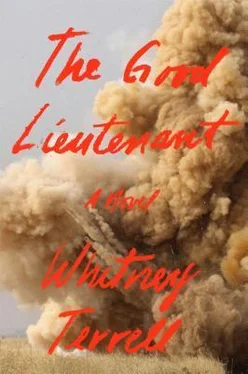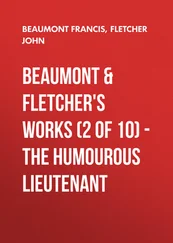“Oh, yeah,” Masterson said grimly. “Freedom — that’s what we’re all about, Lieutenant. The problem is we got too much of it around here.”
If this was a joke, or even an unexpectedly intelligent comment, Fowler couldn’t tell it from his face. Instead, as Anderson’s bald head disappeared into the dark shed, Fowler noticed Masterson fiddling with a roll of black electrical tape that he’d earlier removed from his pocket. He fitted a strip over the stitched FOWLER on her fatigues, tearing it with his teeth, then tossed the roll to his lieutenant as he reemerged. This made the cuffed figure who shuffled along beside Anderson, accompanied by the searing, eye-watering reek of unwashed human flesh, all the more surprising. It was Faisal Amar, the smart-ass interpreter who worked for Delta Company, the young man with the mole and the dusty gray suit. The man she’d come to see. “Faisal has begun working with us in a more advisory capacity,” Masterson said. “Maybe you’d like to advise him to share his knowledge of what happened to Sergeant Beale yesterday.”
* * *
Faisal Amar’s condition, his dangling arm and tufts of missing hair, embarrassed her more than she’d expected — worse, somehow, than when Beale had hit him three weeks earlier, because the injuries seemed almost meditative. Deliberate rather than passionate. She also disliked the clothes that Masterson’s lieutenants had dressed him in, once they’d taken him into custody: scrawny, shifty arms sticking out of a Lakers jersey like a drag queen’s, a pair of oversize shower slippers on his crusty feet. But his hostility was clear enough. You saw guys like that at gas stations in Kansas City: pompous, sallow-eyed, acting like they had a secret answer to everything. Real sweeties to women, they were supposed to be. Wondered why their countries looked like shit when they kept trying to blow up everything. After Lieutenant Anderson left, he studied her face, then shrugged at her covered name tag. “I know you,” he said.
“Yes, you do,” Fowler said, peeling off the tape.
“Three weeks ago you beat me up. Now you lose a soldier. Man, you are on some kind of streak.” She got a genuine leer out of his thin face, salt whitening the corners of his mouth: they had bad luck in common. A nice thought. Unless it wasn’t bad luck at all that Faisal appeared to be connected to both of these events.
“You remember a lieutenant named Pulowski?”
Here was some bad acting in her opinion: squinting, ceiling examined, eye movements to suggest the ruffle of memory. “Which time is this?”
“He brought you to this man.” She showed him the note that Pulowski had given her and pointed to the drawing of the anonymous Iraqi’s face. “We think he has information about my missing soldier, Sergeant Beale. We also think you know him and you pretended not to. Why would you do that, Faisal? Why would you lie to us in such an important case?”
“We do hundreds of these, lady,” Faisal said, “a million, whatever. Come on. I do not know this person.” He craned his neck so he could shout around her, toward the door. “Hey, boss. You got somebody more interesting for me?”
She felt a trigger flipping in her head, lower than her brain — down in the spinal cord, the center of the neck — and she jerked his slim, champagne-flute wrist down and leaned in, her elbows on his knees. “Just read the goddamn paper!” she said. “Read it and tell me the truth about what it says.”
Her actions and her words felt thick and meat-headed — as bad as Masterson’s riff on Watts — and yet Faisal overopened his eyes and licked his lips to simulate eagerness to please. Then, as he focused on the text, his features shut down, as if a plastic sheet had covered them. No need to translate that. “It is nobody,” he said. “This man.”
“What I’m curious about,” she said, “is when you’re going to realize that you might want to start telling the truth. If you think I’m here to save you”—when Faisal made a move to protest, she grabbed his face where Anderson had bruised it—“I’d ask myself, why aren’t I being processed? I offered to take you back to Camp Tolerance, but these guys, the one who hit you—”
“Anderson.”
“Anderson told me that there wasn’t any paperwork on you.”
She backed off, waited. Faisal limped to the threshold of his cell and nodded at the door, which she opened. “Three letters,” he said. He held up three fingers, his zip-cuffed hands paired beneath his chin, then jumped over the threshold with an odd sideways hop, as if skipping rope. “Three letters, personal testimony from real Iraqis, yes? We take, we fax to Washington, get okay, the bad guys go in here. Hard to get, this testimony. This guy is bad, he did this to me. People know but don’t want to say. So I write them—”
“Yeah, I know, you translate Masterson’s arrest affidavits,” Fowler said, though Faisal’s tone caused her to shiver, to notice the sweat cooling beneath her undershirt.
“No, I make them up ,” Faisal said. There was a strangely mechanical element to his speech. “Whoever he wants to shoot, whoever he wants to detain, I make up a story of how they are bad. Like in a movie. So if the captain arrests me ”—he tapped the socket of his eye, then pointed out across the dusty expanse of the patrol base and made a whooshing sound, fanning out his fingers, as if a flood had covered everything in sight—“everybody, every people he send to jail the past six months, they go free. And these people will come to find him personally. He knows this, so he does not charge me.”
“You faked the affidavits,” Fowler said.
“What the fuck?” Faisal said. “How else does he catch so many this way?”
* * *
Twenty minutes later, Fowler pushed into the last of eight long brown tents that occupied the southern end of the patrol base. Masterson’s staff had warned her not to disturb the captain at this time of day, and the farther she wandered down the stifling rows of empty bunks, draped with gear, Kevlars, and sweaty fatigues, the less certain she was that ignoring their warning was a sound tactic. The tent’s far end had been sectioned off by a wall of egg crates and she found him there, laid out like a pharaoh, an iPod glowing on his chest, his bare, callused feet atop a plain white sheet. A thick line of black crew cut scalloped low across his forehead, and his skin was acne-pitted, which, when he was awake, gave his features a roughened look but now resembled a putty covering for some other, younger face. “Sir, could I talk to you for a minute?” she asked.
Masterson raised his eyebrows, rubbing the back of his head against his wrists. He’d been a club rugby player at Oklahoma State and, at Fort Riley, a serious lifter, but he’d dropped at least twenty pounds, and now sat up gingerly, as if his skeleton had been riddled with some incurable disease — not a good sign, especially if what Faisal had told her was true. “You’ll have to excuse me,” he said. He made an effort to lift his head, but this failed, and he belched and quickly aimed his gaze at the floor again. “This is not really my best time of day. We’re running these patrols all night. It’s a twenty-four-hour operation. I like to be there. So this is really my time to sleep.”
There was, for the first time, a hint of apology in his voice — though it was factual, not self-pitying — and by way of answer, since she wasn’t leaving, Fowler reached under his makeshift desk, grabbed a wheeled stool, and rolled it between her knees.
“Why’d you have Faisal detained?” she said.
Masterson chuckled as if she’d made a joke, then spat dryly into a wastebasket. “There’s a killing field out here along Route Trap. An old field where Faisal used to play soccer as a kid. Yesterday, Anderson finds a body out there with a communiqué pinned to its chest, saying Faisal organized the bombing at the Muthanna intersection.”
Читать дальше












